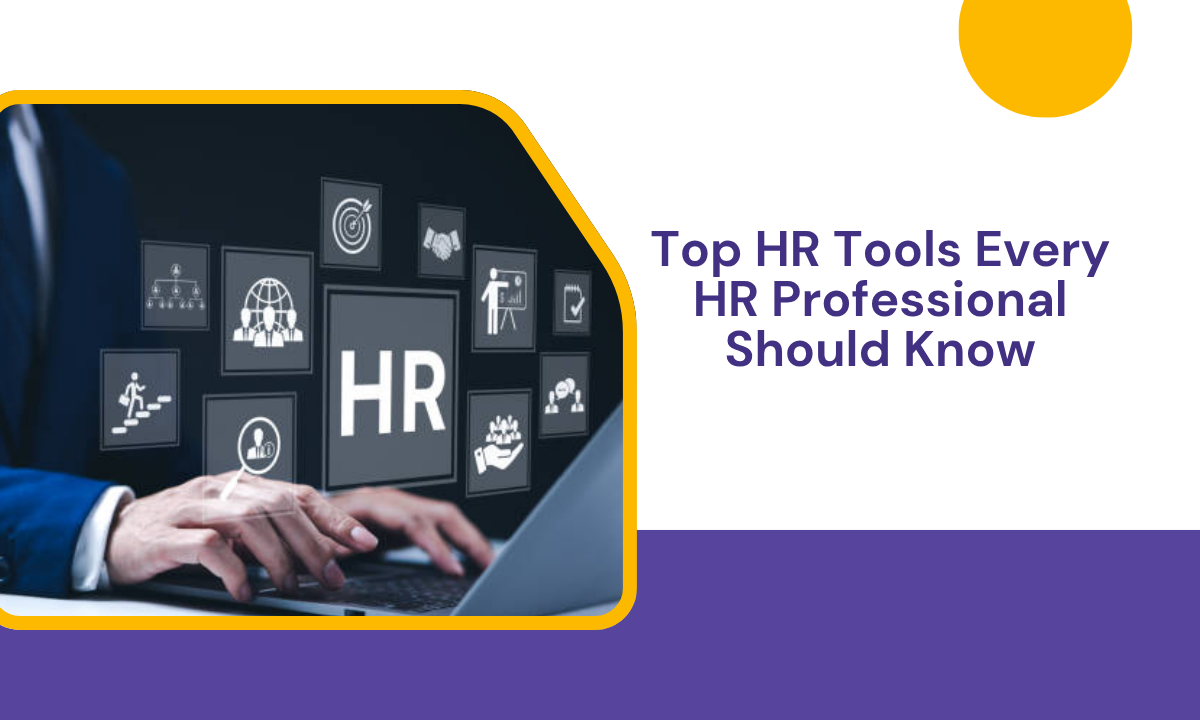Table of contents:
|
1. Understanding Why HR Tools Matter |
|
2. Key Categories of HR Tools and What They Do |
|
3. How Training Makes a Difference |
|
4. Real-World Examples You’ll Find Useful |
|
5. What HR Professionals Skills Are Most Important Now |
|
6. Wrapping Up |
|
7. Frequently Asked Questions (FAQs) |
As a trainer at Apponix Training Institute in Bangalore, I’ve seen how essential the right HR tools are for effective human resource management. Whether you’re a seasoned HR professional or just developing your HR professional skills, using modern HR tools software, HR recruitment tools, HR analytics tools, HR management tools and HR tech tools can make your work smarter, faster and more strategic.
In this article, we explore the top tools you should know and how the right training sets you up to use them, especially if you’re looking at an HR Training Course in Bangalore to level up.
Understanding Why HR Tools Matter
In today’s workplace, HR professionals must juggle many responsibilities, from recruitment and onboarding to engagement, performance and analytics.
Relying only on manual spreadsheets or outdated systems won’t cut it. Companies expect HR to be data-driven, agile and aligned with business strategy. That’s why HR tools have become central: they help automate routine tasks, give insights via HR analytics, support management with HR management tools, and ensure effective engagement and development.
When you know which tools to use and how to use them, you elevate your role from administrative support to strategic partner.
Key Categories of HR Tools and What They Do
Here’s how different types of HR tools help you in your daily work:
HR Analytics Tools
These tools help you collect, analyse and visualise workforce and performance data. As HR professionals, we need insights into turnover trends, productivity, learning gaps and more. HR analytics tools allow you to make informed decisions rather than guesses. With the right training, you’ll understand dashboards, metrics and how to translate numbers into action.
HR Recruitment Tools

Recruitment is one of the earliest areas where technology made big leaps. HR recruitment tools include applicant tracking systems (ATS), sourcing platforms, pre-employment testing tools, and candidate relationship management systems. These help streamline hiring, improve the quality of hire and shorten time-to-fill. If you want to be efficient in talent acquisition, mastering these tools is key.
HR Management Tools
Also called HRMS or HCM platforms, HR management tools cover many functions: employee data, performance reviews, compensation, benefits, leave, compliance and more. For HR professionals with broad responsibilities, knowing how to navigate and optimise these tools helps keep operations smooth and contributes to strategic HR.
HR Tech Tools and HR Tools Software
This is a broader category that includes cloud-based platforms, automation bots, AI-enabled applications and integrations. If you’re preparing for the future of HR, becoming familiar with HR tech tools means you’re ready for emerging demands like workforce planning, skill-mapping and predictive analytics. A modern HR Training Course in Bangalore should cover this to ensure you are future-proof.
HR Research Tools and Techniques
Finally, it’s not just about tools for operations—it’s about tools and techniques for gathering research, benchmarking, pulse surveys and employee sentiment analysis. HR professionals skilled in research tools can design better programmes, measure impact and bring evidence to the table when proposing initiatives.
How Training Makes a Difference
When you enrol in a course at a good Training Institute in Bangalore and select an HR Training Course in Bangalore with a modern curriculum, you gain more than tool names; you gain how to use the tools, why they matter and what outcomes you can drive. At Apponix, we emphasise hands-on labs, case studies and real-world simulations so you don’t just know the tool but use it effectively. For example:
-
Learning how to set up dashboards in HR analytics tools and interpret them to reduce attrition.
-
Using an ATS in a recruitment simulation to manage candidate pipelines and improve time-to-hire.
-
Integrating an HRMS platform to streamline performance review cycles and link them to business goals.
-
Applying cloud-based HR tech tools automation to reduce manual tasks and free up time for strategic work.
-
Designing and executing employee research studies using tools and techniques to gauge engagement and feedback.
This training transforms HR professionals from process executors into strategic enablers.
Real-World Examples You’ll Find Useful
When I train groups at Apponix, we use real-world scenarios to show the impact of tools. Here are some example use-cases:
-
A mid-sized company used an HR analytics tool to identify teams with high attrition; the HR team then implemented targeted learning programmes using those insights.
-
A startup implemented a modern ATS and recruitment tool to build a talent pipeline ahead of scaling, reducing hiring costs and improving quality.
-
A global firm integrated its HRMS with a learning platform and used automation to trigger onboarding tasks, freeing HR to focus on culture and experience.
-
Another organisation used research tools and techniques to run monthly sentiment surveys, built heat maps of engagement, and tied them to retention and performance metrics.
These stories show that mastering HR tools is not optional—it’s essential to deliver measurable results.
What HR Professionals Skills Are Most Important Now
As we look forward, HR professionals need a mix of technical tool skills and human-centric abilities. Some of the most valued capabilities include:
-
Data literacy: Interpreting analytics from HR tools and converting them into insights.
-
Digital agility: Adapting to new HR tech tools and software as they evolve.
-
Research mindset: Using research tools and techniques to gather meaningful data from the workforce.
-
Strategic thinking: Choosing the right HR management tools to align with organisational goals, not just using what’s available.
-
People advocacy: Ensuring that tool-driven processes still centre on experience, fairness and inclusion.
-
Continuous learning: Tools change fast—so staying current via an HR Training Course in Bangalore or similar helps you stay ahead.
By developing these skills in tandem with tool mastery, you position yourself as a valued HR professional prepared for the future.
Wrapping Up
From where I stand as a trainer at Apponix Training Institute in Bangalore, I can say confidently that mastering the right HR tools is the gateway to modern HR success. You can no longer rely on the traditional scope of HR alone; today’s environment demands tool fluency, data-driven insight and a strategic mindset. Whether you are exploring HR analytics tools to guide retention, HR recruitment tools to source talent rapidly, or HR management tools to simplify operations, having the right software and knowing how to use it makes all the difference.
If you’re based in or around Bangalore, choosing a strong Training Institute in Bangalore that offers an HR Training Course in Bangalore focused on these tools will accelerate your journey. At Apponix, we tailor our curriculum to reflect real-world HR tech scenarios, ensuring that you walk out not just with a certificate, but with hands-on competence. When you embrace HR tools, you’re not just performing HR; you’re elevating it.
I encourage you to take the next step today. Dive into the tools, sharpen your HR professionals skills, and invest in training that moves you from task-oriented HR to strategic HR leadership.
Frequently Asked Questions (FAQs)
Q1. What exactly are HR tools?
HR tools encompass software, platforms, methodologies and applications used by HR professionals to perform recruiting, analytics, management, engagement and development tasks more effectively.
Q2. Do I need to know all types of HR tools before starting an HR role?
No. It’s more important to start with foundational tools (such as an ATS or HRMS) and then gradually build expertise with analytics, research tools and advanced tech. Training helps you progress in a structured way.
Q3. How can I decide which HR recruitment tools and HR management tools to prioritize?
Assess your organisation’s needs: Are you hiring a lot? Then recruitment tools matter. Are you dealing with large data sets and turnover issues? Then analytics tools come first. A training course helps you map tools to your context.
Q4. What value does an HR training course in Bangalore provide for tool mastery?
A quality training course introduces you to a variety of tools, shows you how to implement them in practical scenarios, gives you hands-on exercises and aligns your learning with current industry demands.
Q5. Are HR tech tools replacing HR professionals?
Not at all. HR tech tools assist HR professionals by automating routine tasks and providing insights. The human skills—empathy, judgement, strategic thinking—remain critical. The best HR professionals are those who combine tool mastery with human-first thinking.




